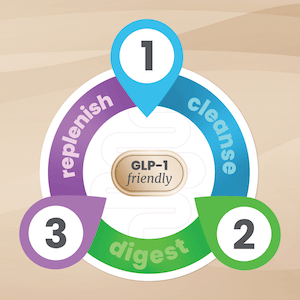You eat a healthy diet, but are you getting enough protein in your diet—for your age and for your lifestyle? Unless you’re specifically counting grams of protein in your meals, it may be hard to gauge how much you’re getting and whether you’re getting enough. The truth is most adults in the U.S. aren’t getting enough protein. And, for adults 51+, this protein deficiency is even more prevalent. That’s according to research in the Journal of Nutrition, Health & Aging.
How much protein do you need? The Recommended Daily Allowance (RDA) for protein is 0.36 grams of protein per pound of body weight. For example, if you weigh 145 pounds, you will need—on average—about 52 grams of protein per day. To calculate how much protein you need, use this handy online calculator. But, keep in mind, this amount is for an average sedentary person. If you’re active or building muscle, you’ll need more. And if you’re pregnant, you’ll need more too. (Experts recommend about 75 to 100 grams of protein per day if you’re pregnant.)
Try it now by clicking here.
6 reasons your body needs protein
First, what exactly is protein? Proteins are large “molecules” that are made up of thousands of smaller units called amino acids. Both protein and amino acids are important for the health of the body—and the brain. In fact, protein is necessary to fuel energy the body and carry oxygen through it. It’s also needed to create new cells. But more specifically, here’s what protein can do for your body:
1. Your muscles need protein to stay strong. Muscles also need protein to get bigger or stronger. This is why protein is referred to as the “building block of muscles.” As we age, we lose muscle mass.This means—if we changed nothing in our lifestyle starting today—our muscles would simply get smaller and weaker. Over time, this loss of muscle would seriously limit our ability to do basic everyday tasks, like walking up the stairs or getting out of a chair.
You can liken getting enough protein every day to putting money away in the bank for a rainy day. It’s an assurance that you’ll have enough protein to not only power your muscles now but also for the long term.
Click here to learn more.
2. Your heart needs protein to work optimally. It’s not just the visible muscles that matter. The heart is one of the most important muscles in the body—and it needs protein to function well.
Try Plant Protein+ With 25 grams of North American yellow pea protein, flaxseeds, and chia seeds. This is perfect for days when you’re not working out.
3. Our gut needs adequate protein to stay balanced. Like the heart, the gut is a muscle that needs enough protein to function well. But more than that, the microorganisms living in the gut also need protein. And a balanced gut has been linked to better health and disease prevention.
Click here to try.
5. Your skin, hair, and nails need protein. Looking for healthier, more radiant and youthful skin? You may want to eat more protein. It turns out that protein is one of the key building blocks of healthy skin, hair, and nails.
But more than protein per se, it’s the amino acids that make up protein that are particularly important for healthy skin, hair, and nails. These amino acids are necessary for the formation of keratin. Keratin is a protein that helps form the skin’s outer layer or epidermis. There, it helps to support your skin and heal wounds. Hair and nails are also made of keratin. Amino acids are also important for the formation of collagen and elastin, proteins in the skin that help keep the skin youthful and plump.
Good sources of protein
To give you a sense of how much protein you’ll get from various sources of foods, here’s a handy guide of some common foods:
3 ounces of salmon: 21 grams of protein
3 ounces turkey or chicken: 19 grams of protein
6 ounces plain Greek yogurt: 17 grams of protein
2 cups low-fat milk: 16 grams of protein
½ cup cooked beans: 8 grams of protein
2 tablespoons peanut butter: 8 grams of protein
1 egg: 6 grams of protein


















